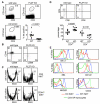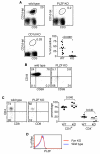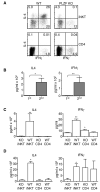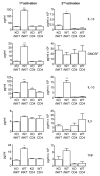The BTB-zinc finger transcriptional regulator PLZF controls the development of invariant natural killer T cell effector functions
- PMID: 18660811
- PMCID: PMC2662733
- DOI: 10.1038/ni.1641
The BTB-zinc finger transcriptional regulator PLZF controls the development of invariant natural killer T cell effector functions
Abstract
Invariant natural killer T cells (iNKT cells) have an innate immunity-like rapidity of response and the ability to modulate the effector functions of other cells. We show here that iNKT cells specifically expressed the BTB-zinc finger transcriptional regulator PLZF. In the absence of PLZF, iNKT cells developed, but they lacked many features of innate T cells. PLZF-deficient iNKT cells accumulated in lymph nodes rather than in the liver, did not express NK markers and did not have the characteristic activated phenotype. PLZF-deficient iNKT cells failed to secrete large amounts of interleukin 4 and interferon-gamma after activation; however, some cells produced either interleukin 4 or interferon-gamma but not both. PLZF, therefore, is an iNKT cell-specific transcription factor that is necessary for full functionality.
Figures








Comment in
-
The making of NKT cells.Nat Immunol. 2008 Sep;9(9):1009-11. doi: 10.1038/ni0908-1009. Nat Immunol. 2008. PMID: 18711440 Free PMC article.
References
-
- Petrie HT, Zuniga-Pflucker JC. Zoned out: functional mapping of stromal signaling microenvironments in the thymus. Annu Rev Immunol. 2007;25:649–679. - PubMed
-
- Rothenberg EV, Anderson MK. Elements of transcription factor network design for T-lineage specification. Dev Biol. 2002;246:29–44. - PubMed
-
- Bendelac A, Savage PB, Teyton L. The Biology of NKT Cells. Annu Rev Immunol. 2007;25:297–336. - PubMed
-
- Kronenberg M. Toward an understanding of NKT cell biology: progress and paradoxes. Annu Rev Immunol. 2005;23:877–900. - PubMed
Publication types
MeSH terms
Substances
Grants and funding
LinkOut - more resources
Full Text Sources
Molecular Biology Databases

